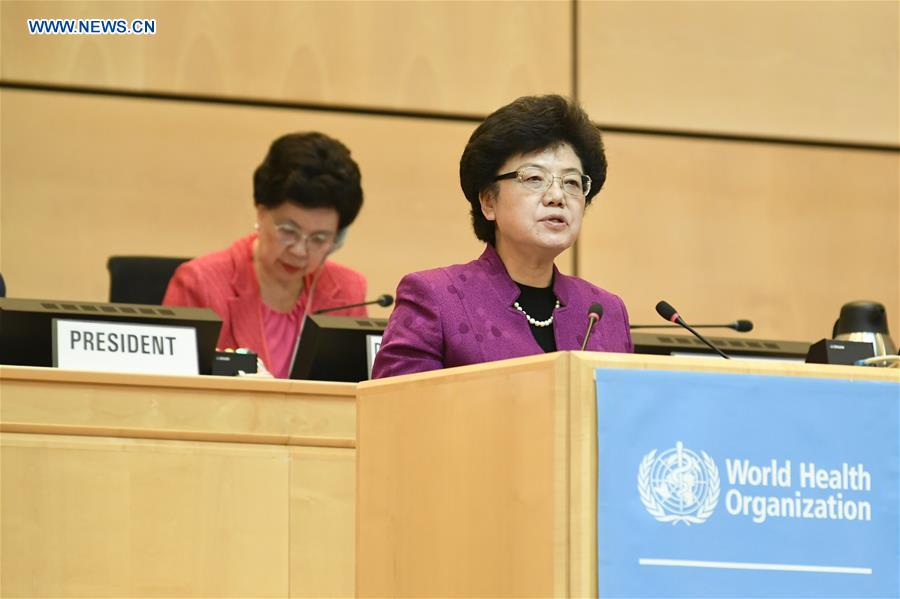


Li Bin (Front), Minister of the China National Health and Family Planning Commission, speaks on the first day of the 70th World Health Assembly (WHA) in Geneva, Switzerland, on May 22, 2017. China has established for its 1.3 billion people a basic medical care system and will continue improving the fairness, accessibility, quality and efficiency of its health service, Li Bin said here Monday. (Xinhua/Alain Grosclaude)
GENEVA, May 22 (Xinhua) -- China has established for its 1.3 billion people a basic medical care system and will continue improving the fairness, accessibility, quality and efficiency of its health service, a senior Chinese official said here Monday.
Li Bin, Minister of the China National Health and Family Planning Commission, shared the experience of China in achieving a better system for health care at the first day of the 70th World Health Assembly (WHA).
China, she said, has been making rapid progresses through a hierarchical medical system, hospital management reform, wider medical insurance, better medicine supplies and comprehensive supervision.
"China emphasizes the establishment of a sound health system through innovation, and gives full consideration to the universality, sociality and integrity of the related factors," she noted.
According to the minister, related authorities like agriculture, education, environment, human resources and social security departments have all joined hands in the public health care efforts so as to form a government-led and demand-oriented health care system.
She said China will arrange closer partnerships between top-tier hospitals and grassroots medical services to provide health management and health care services for urban and rural residents alike in a more inclusive and coherent manner.
The goal for this medical partnership is to make quality medical care more accessible to the wider public, the Minister said, especially in less-developed areas and the grass-root level.
The Chinese government is also planning to take further steps in allocating high quality medical resources to wider regions by dispatching teams of medical professional to less developed areas with enhanced sharing and inter-operating of health and medical services.
As part of the plan, the China National Health and Family Planning Commission recently announced that family doctor services will be extended to over 85 percent of Chinese cities, covering 30 percent of the urban population and over 60 percent of priority groups in 2017.
The 70th WHA, the main decision-making body of the World Health Organization, opened at the Geneva-based UN headquarters on Monday.
During the 10-day session, this year's assembly will determine policies on a range of health issues, including medicines and health products, non-communicable diseases, health emergencies, as well as maternal, new-born, child and adolescent health.

 Award-winning photos show poverty reduction achievements in NE China's Jilin province
Award-winning photos show poverty reduction achievements in NE China's Jilin province People dance to greet advent of New Year in Ameiqituo Town, Guizhou
People dance to greet advent of New Year in Ameiqituo Town, Guizhou Fire brigade in Shanghai holds group wedding
Fire brigade in Shanghai holds group wedding Tourists enjoy ice sculptures in Datan Town, north China
Tourists enjoy ice sculptures in Datan Town, north China Sunset scenery of Dayan Pagoda in Xi'an
Sunset scenery of Dayan Pagoda in Xi'an Tourists have fun at scenic spot in Nanlong Town, NW China
Tourists have fun at scenic spot in Nanlong Town, NW China Harbin attracts tourists by making best use of ice in winter
Harbin attracts tourists by making best use of ice in winter In pics: FIS Alpine Ski Women's World Cup Slalom
In pics: FIS Alpine Ski Women's World Cup Slalom Black-necked cranes rest at reservoir in Lhunzhub County, Lhasa
Black-necked cranes rest at reservoir in Lhunzhub County, Lhasa China's FAST telescope will be available to foreign scientists in April
China's FAST telescope will be available to foreign scientists in April